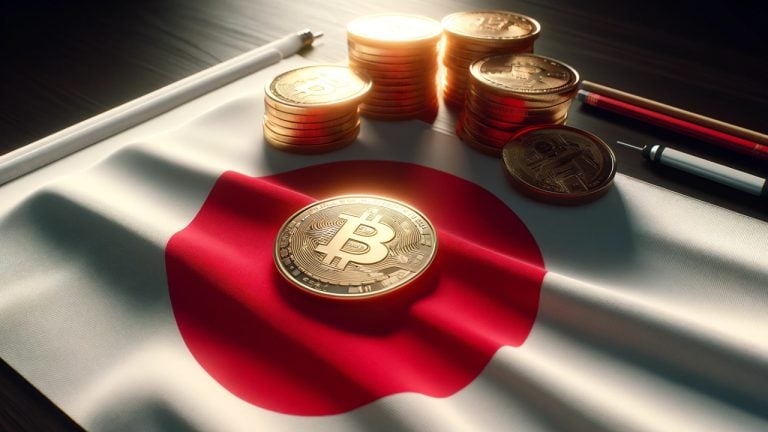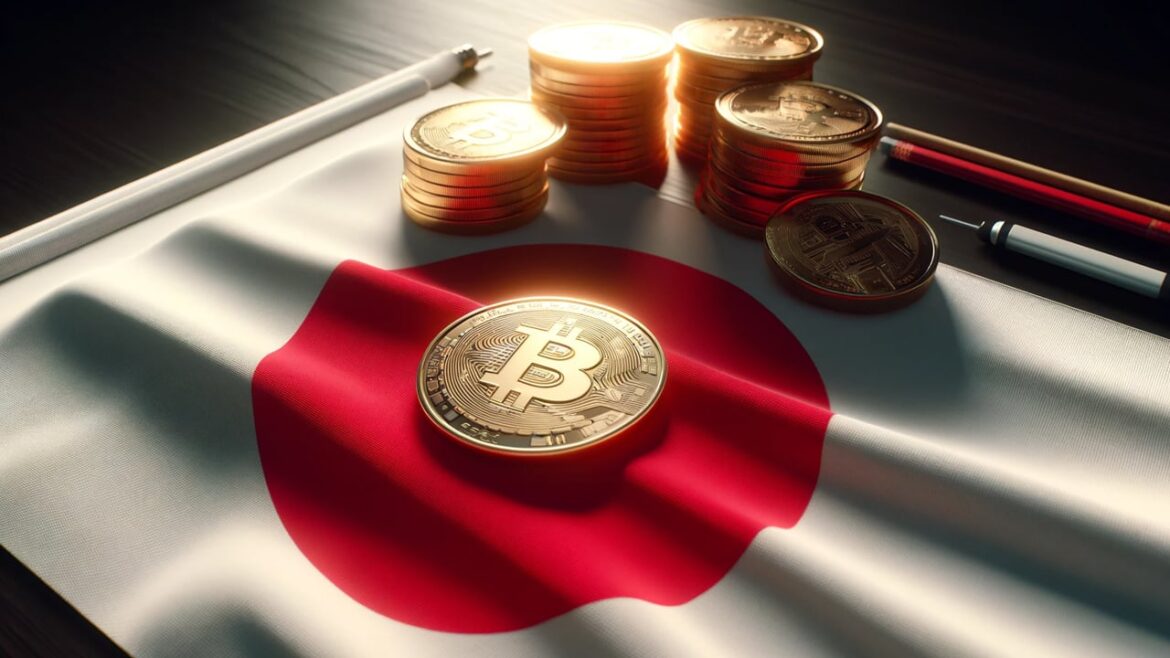 According to the latest figures, Metaplanet, a company listed on the Japanese stock exchange, witnessed its share price soar by nearly 90% in just one day. This significant jump came on the heels of the company’s announcement regarding its intention to incorporate 1 billion yen in bitcoin into its balance sheet. Metaplanet Joins Forces With […]
According to the latest figures, Metaplanet, a company listed on the Japanese stock exchange, witnessed its share price soar by nearly 90% in just one day. This significant jump came on the heels of the company’s announcement regarding its intention to incorporate 1 billion yen in bitcoin into its balance sheet. Metaplanet Joins Forces With […]
Source link
Japanese
Japanese banking giant Nomura launches ETH fund via crypto unit Laser Digital

Japan’s largest investment bank, Nomura Holdings, is launching an Ethereum-based fund for institutional investors through its digital assets subsidiary Laser Digital Asset Management, according to a Nov. 9 press release.
The “Laser Digital Ethereum Adoption Fund SP” fund marks the second installment in a series of digital adoption investment solutions introduced by Laser Digital following the launch of the Laser Digital Bitcoin Adoption Fund in September.
Ethereum Adoption Fund
The new fund will primarily target long-only spot positions in Ethereum. It enhances yield through an innovative strategy that involves staking the ETH held by the fund. The fund is managed as a segregated portfolio within Laser Digital Funds SPC, a segregated portfolio company registered in the Cayman Islands.
Laser Digital has partnered with Komainu as custodian for the fund’s assets. The company also serves as the custodian for Laser Digital’s Bitcoin fund. Komainu is regulated under the U.K. Financial Conduct Authority and the Virtual Asset Regulatory Authority in Dubai.
Laser Digital Asset Management head and former Nomura Chief Scientist Officer Sebastian Guglietta said the company views Ethereum as the technological catalyst that will digitize the economy. He added that in the long run, exposure to Ethereum is crucial to capturing the structural technology trend of the web 3 economy.
Meanwhile, Laser Digital Asset Management head of distribution Fiona King said the fund will simplify investing in digital assets and provide a secure way for institutional investors to gain exposure to the industry as it is fully regulated.
ETH spikes amid positive news
Beyond the Nomura announcement, documents surfaced on Nov. 9 showing that BlackRock has registered an Ethereum-based exchange-traded fund (ETF) in the state of Delaware on the same day.
The ETF was registered under the name iShares Ethereum Trust. BlackRock similarly filed its Bitcoin ETF a week before applying with the SEC.
News of large traditional financial institutions diving into Ethereum has caused the token to rally and break past the $2000 resistance level. ETH was trading at $2,007 at press time — more than 5.8% over 24 hours, according to CryptoSlate data.
The Japanese yen’s plunge forces Tokyo to pull back on biggest defense build-up since World War II as US weapons get pricier

-
A 10% drop in the yen since December has forced Japan to scale back defense spending, Reuters reported.
-
The currency’s decline has boosted the cost of US-made weapons that Japan plans to procure.
-
In response, Japan is prioritizing frontline weapons and spending less on support systems.
Japan is scaling back plans for its largest military build-up since World War II, after weakness in the yen raised the cost of US-made defense equipment, sources told Reuters.
When the $320 billion budget plan was first announced in December, its estimated price tag was based on a 108 yen-to-dollar exchange rate, according to the report. But the currency has since slid more than 10%, dipping to 151 earlier this week.
And because the defense ministry doesn’t hedge against foreign-currency volatility, it must shoulder higher costs for top acquisition programs like the F-35 stealth fighter and Tomahawk cruise missile, the report said.
In response, Japan is prioritizing outlays on US-made frontline weapons that would be key in any conflict with China, sources told Reuters.
The tradeoff is less money for secondary equipment, such as support aircraft. For instance, an expected order of 34 twin-rotor Chinook transport helicopters was pared to 17 in next year’s budget request, given that their cost rose by about 5 billion yen each. Around half the increase was due to the weak yen.
And the purchase of two ShinMaywa Industries US-2 seaplanes was also scrapped as the aircraft’s price almost doubled from three years ago.
The historic military build-up is in response to rising geopolitical tensions that require the US ally to prepare for any potential conflict with China.
Meanwhile, the yen’s plunge results from ultra-loose monetary policy in Japan, as record low yields in the country have pulled down its competitiveness against other global markets. That’s as other central banks like the Federal Reserve have become more hawkish, making overseas assets more attractive.
Though the Bank of Japan has recently eased its yield curve control — a unique measure that restricted yields from climbing — analysts have suggested that this isn’t enough. In a recent note, Deutsche Bank outlined that yen volatility will continue until the central bank lifts interest rates and sheds its quantitative easing campaign.
Since the start of this year, the yen has plunged 12% against the dollar.
Read the original article on Business Insider
Japanese yen-backed digital currency, DCJPY, to go live in July 2024

On Oct. 12, digital currency and electronic payments firm DeCurret Holdings published a white paper on its cryptocurrency project, the “DCJPY.“ The organization intends to launch the coin in July 2024.
According to the white paper, the DCJPY Network will consist of the Financial Zone and the Business Zone. The former will include banks minting deposits as digital currency on the blockchain, while the latter will be reserved for transactions. The Business Zone will also provide space for issuing nonfungible, security and governance tokens.
Related: Japan to allow startups to raise funds by issuing crypto instead of stocks
The leading issuer of the DCJPY, which will be backed by deposits in Japanese yen, will be the Aozora Bank, a commercial entity with 19 domestic branches in Japan. In 2021, DeCurret reported about a consortium of 70 Japanese companies that would participate in the DCJPY Network. While the white paper doesn’t mention any specific names of the network participants, DeCurret itself is backed by 35 shareholding companies, with Japan Post Bank, Mitsubishi and Dentsu Group among them.
DeCurret will hold a seminar on the white paper explaining the main points behind the project on Oct. 18. The meeting will take place in Tokyo and won’t be screened online.
In May 2023, the Bank of Japan released the results of the second phase of its central bank digital currency experiment. It will make a final decision on issuing a “digital yen” by 2026.
Meanwhile, Binance and Mitsubishi UFJ Trust and Banking Corporation are exploring the issuance of Japanese yen and other foreign currency-denominated stablecoins in the country.
Collect this article as an NFT to preserve this moment in history and show your support for independent journalism in the crypto space.
Magazine: Beyond crypto: Zero-knowledge proofs show potential from voting to finance
A recent study has revealed that Japanese investors are choosing to invest in Ripple’s XRP over the world’s flagship cryptocurrency, Bitcoin.
XRP Over Bitcoin And Ethereum
In contrast to the treatment Ripple and the XRP token are receiving in the US, Japan seems more welcoming to the crypto asset, according to a research paper by the Department of Economics and Finance at the City University of Hong Kong.
According to the report, XRP is preferred over the biggest cryptocurrencies by market cap, Bitcoin and Ethereum. It referenced a survey conducted by the Japanese crypto exchange BITMAX, with 25% of the 1,498 respondents who took the survey choosing XRP as their favorite cryptocurrency, while 26% and 9% chose Bitcoin and Ethereum, respectively.
While this survey may be considered insufficient to prove Japanese investors’ preference for the XRP token, it suggests that the token has quite the following in the country. Interestingly, XRP enjoyed the highest spot trading volume in February last year, with “nearly 1.36 billion units” traded during that period.
The report attributed Japan’s fondness for the token to the country’s customs and “the confidence that Japan’s largest venture capital fund has in Ripple.” The venture capital firm in question is SBI Holdings, with the company being one of Ripple’s early partners. SBI allegedly invested close to $300 million in Ripple in 2017.
SBI Holdings A “Primary Driver Of Ripple’s Success”
The report labels SBI holdings as the “primary driver of Ripple’s success” in Japan. This assertion may not be far-fetched, especially considering SBI’s role in helping Ripple break into the Japanese market.
In 2016, the financial services company partnered with Ripple to create SBI Ripple Asia with the goal of providing cross-border payment services to banks in the Asian region. Using Ripple’s distributed ledger technology (DLT), these banks can process cross-border transactions in “40 currencies and more than 70 countries.”
SBI Ripple was to service banks in countries like Japan, China, South Korea, and other Southeast Asian countries. This move undoubtedly paved the way for Ripple and its XRP token to penetrate the Asian market (Japan in particular) early enough, especially when non-cash payments were on the rise in those countries.
Ripple and XRP’s adoption in the Asian region is also expected to grow further as SBI Remit (a subsidiary company under SBI Holdings) recently expanded the SBI Ripple Asia partnership with the introduction of an XRP-based international remittance service for banks in the Philippines, Vietnam, and Indonesia.
This move aligns with Ripple’s goal to disrupt the global financial system as the crypto asset will be used as a bridge currency for foreigners who want to send money to their families back home. Impressively, Ripple’s Ledger can process these transactions faster and more affordably than the traditional financial system.
Token price resting at $0.49 | Source: XRPUSD on Tradingview.com
Featured image from Investopedia, chart from Tradingview.com
With 34 tokens, Binance will offer more coins than any exchange operating in Japan.
Leading cryptocurrency exchange Binance has unveiled its plan to re-enter the Japanese market. The announcement comes after Binance noted in July that it was making a comeback in Japan.
Binance pulled out of Japan in 2018 after the country’s financial regulator accused it of operating without regulatory clearance. Following failed attempts to obtain an independent license, Binance acquired the Sakura Exchange Bitcoin (SEBC) in November 2022. This allowed it to obtain the necessary license to operate in Japan.
With its launch imminent, Binance announced it will launch its Japan subsidiary with 34 tokens, including Bitcoin (BTC), Ether (ETH), Litecoin (LTC), XRP, and BNB coin. This is also the first time that Binance will be offering BNB coins in Japan.
With 34 tokens, Binance will offer more coins than any exchange operating in Japan. According to Coinpost, major domestic competitors Bitbank, GMO Coin, and Coincheck only offer 30, 26, and 22 assets respectively.
CZ Excited about Binance Japan
Binance CEO Changpeng Zhao (CZ) expressed his excitement about the re-entry into Japan, saying that it is a “strategic market” for the exchange. CZ noted that Japan has been clear on its regulations for almost a decade. Consequently, he labeled the country as “a leader in the Web3 regulatory environment”.
Indeed, Japan is one of the most advanced and regulated markets for cryptocurrencies in the world. The country has about 28 licensed crypto exchanges, according to Statista. It also recognized Bitcoin and other digital assets as a legal form of payment since 2017. Binance’s re-entry into Japan could bring more opportunities for the crypto sector in the country.
Aside from its crypto asset deposit and withdrawal services, Binance Japan will allow users to access the platform’s spot trading, crypto asset market, and NFT marketplace. The simple earn feature, automatic purchase, and API connection will also be available for use. Outside this list, Binance has stated that any other service would not be available through Binance Japan for now.
Regulatory Headwinds Threaten Binance Globally
Elsewhere, Binance continues to battle with regulators and licenses. In the US, Binance is facing accusations of mishandling customer funds and manipulating trades. In France, officials raided the exchange while in Australia, regulators are probing the company’s operations. Combined with the withdrawal of its license in several jurisdictions, Binance is clearly facing regulatory headwinds in many parts of the world. However, CZ remains convinced that this will not stop the exchange.
next
Binance News, Blockchain News, Cryptocurrency news, News

An experienced writer with practical experience in the fintech industry. When not writing, he spends his time reading, researching or teaching.
You have successfully joined our subscriber list.
Japanese Web3 developer HashPort Group raises $8.5M in funding round
Japanese blockchain developer HashPort has raised 1.2 billion Japanese yen ($8.5 million) in a Series C funding round led by Sumitomo Mitsui Banking Corporation, The University of Tokyo Edge Capital Partners and Japanese billionaire entrepreneur Yusaku Maezawa. The new round brings HashPort’s total funding to 2 billion yen ($14.2 million).
According to the July 28 announcement, the funds will allow HashPort to consolidate business and secure a compliance management system and related personnel to navigate the sophisticated global regulatory environment for its expansion. The HashPort ecosystem includes its namesake blockchain-related consulting and system solution in Japan and HashPalette, a public chain specializing in nonfungible tokens (NFTs). The company is also scheduled to launch a metaverse game dubbed The Land Elf Crossing in the fourth quarter.
In July 2021, HashPort’s Palette Chain partnered with cryptocurrency exchange Coincheck to launch Japan’s first initial exchange offering (IEO), or an initial coin offering facilitated by an exchange. The IEO raised a total of 22.45 billion yen ($160 million) in Palette (PLT) token commitments. The company claims that since then, PLT Place, the official NFT marketplace of Palette Chain, has accumulated over 370,000 users.
HashPort Group president Seihaku Yoshida said the company plans to cooperate with Expo 2025, an upcoming expo to be held in Osaka, Japan, to build digital wallets and digital passports linked to soulbound tokens (SBTs). “Expo 2025 is expected to attract more than 28 million visitors. If more than 10 million people experience Web3 for the first time, we believe this will be a historic event,” Yoshida wrote.
In December 2022, Cointelegraph reported that Sumitomo Mitsui Banking Corporation, now an investor in the company, partnered with HashPort to issue SBTs. The companies plan to research SBTs to explore practical uses for communities, jobs, knowledge-sharing services and decentralized autonomous organizations.
SBTs were previously proposed by Ethereum co-founder Vitalik Buterin as proof of the characteristics or reputation of a person, entity or “soul.” The name derives from soulbound items linked to a character in the MMORPG World of Warcraft.

Magazine: Crypto City: Guide to Tokyo









